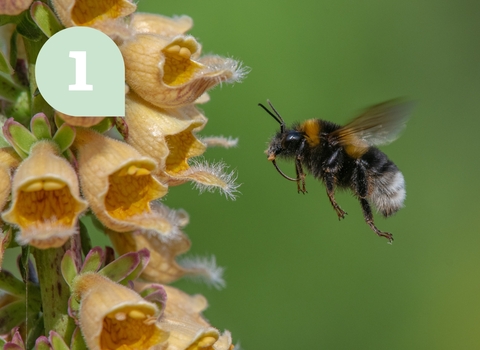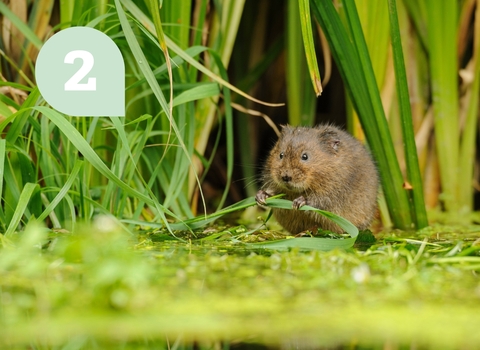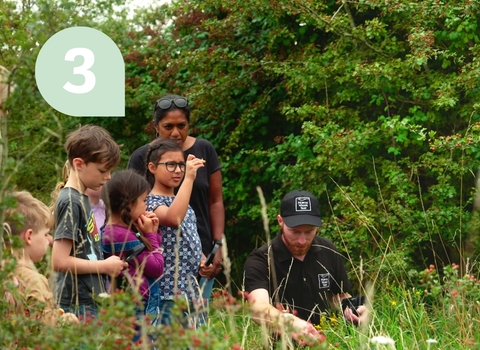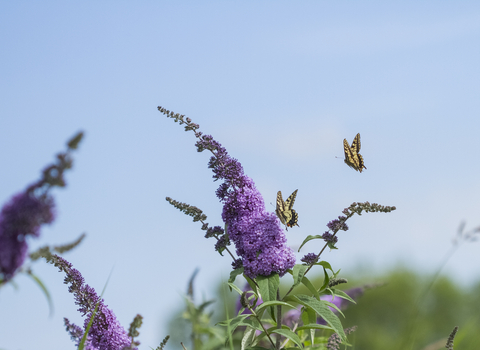With the 2024 General Election behind us, we have been working with Norfolk's MPs to support our wildlife. The government is responsible for turning around our position as one of the most nature-depleted countries in the world. The steps they take over coming years will be critical.
We've written a 'Plan for Nature', which sets out three key priorities - three things which the government must do to give nature a fighting chance – and ensure wildlife is abundant and thriving in Norfolk. We shared our Plan with all MPs asking them to support our three priorities for nature and commit to championing the actions needed for nature's recovery in their constituency.
Our three priorities for nature

Bee (credit: Steve Evans)
Bring back Norfolk's wildlife
One in six species is at risk of extinction in the UK. Norfolk is no exception. Our wealth of varied habitat supports 417 Priority Species, which urgently need our help. To halt and reverse the collapse of our natural world, we need the government to put nature into recovery by protecting and restoring at least 30% of land and water for nature by 2030. We have the means to do this, and now it’s time for action.
How can the government achieve this?
Protect what we already have
Prevent further habitat loss by ensuring new development both protects and enhances nature. This includes rethinking our approach to sustainable transport and abandoning the current proposal for the Norwich Western Link Road.
Improve what we already have
Increase funding for protection and restoration of our most precious habitats such as meadows, ancient woodlands, chalk rivers and heaths.
Create more space for nature
Increase national funding for wildlife-friendly farming to at least £4.4 billion per year2 and link this to Local Nature Recovery Strategy Priorities to ensure the agricultural transition is fair to farmers and better for wildlife, while providing healthier and more affordable food for all.
Connect wild spaces
Improve funding and protection for simple features such as hedgerows and farm ponds at landscape-scale within our farmed landscape.
Prioritise pollinators
To save the future of insects, and all life that depends on them, halve pesticide use by 2030 and ban bee-killing and human-health-harming neonicotinoids.
Integrate climate change in policy
Help nature adapt to climate change by integrating climate change across all UK Government policies.

Water vole (credit: Terry Whittaker)
End river pollution and tackle water scarcity
Toxic levels of sewage and agricultural run-off, unsustainable groundwater abstraction and damage to our wetland landscape has left our rivers in desperate need of help. Norfolk has over 420km of chalk rivers and streams but the health of these world-renowned habitats is at great risk. If we want healthy rivers, then action must be taken.
How can government achieve this?
Halve nutrient pollution from farming, sewage and development by 2030
With incentives for farmers and investment in removing nutrients from sewage as well as properly resourcing enforcement agencies so they can monitor and inspect polluters and enforce penalties upon those who break the law.
Invest in creating and repairing wild habitats
To provide a natural solution to flooding and drought, which will protect people’s homes and businesses, and improve water quality.
Invest in a holistic approach to managing water resources in Norfolk
To ensure that there is enough water for nature, people, farming and business. Norfolk has over 420km of chalk rivers and streams but the health of these world-renowned habitats is at great risk.
Stand up for our chalk streams in planning policy reforms
The Government has a valuable opportunity to stand up for our chalk streams in their planning policy reforms. We are calling on them to introduce specific legal protections in planning for all our chalk streams, to protect them from development-related harm.
Find out how you can get involved:

A family at Sweet Briar
Let nature help
Spending time in nature boosts physical and mental health, and healthy habitats protect us from the impacts of climate change, boost our food security and underpin our economic prosperity. We must ensure that everyone has fair and equal access to restorative natural places in their neighbourhood (such as our new urban nature reserve at Sweet Briar Marshes in Norwich), and that natural solutions are implemented at scale across every community.
How can the government achieve this?
Fund and integrate green prescribing
Fund and integrate green prescribing into health and social care services in the community.
Improve access to nature for all
By connecting landscapes with people and increasing green and blue spaces in urban areas so that everyone is within 15 minutes’ walk of high-quality natural space.
Introduce new statutory guidance to deliver natural history and outdoor learning for all
Introduce new statutory guidance to deliver natural history and outdoor learning for all, to ensure our schools support happier, more confident children who understand their impact on our natural world.
Prioritise natural flood mitigation solutions
Prioritise natural flood mitigation solutions to help protect communities and natural sites from the impacts of flooding.

